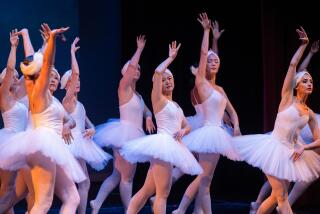Pop Dancing Thrives : Young, Old Are Rockin’ in China
- Share via
BEIJING — American rock music blared out of stereo speakers as 16-year-old Zhang Jing stepped in front of the teen-age crowd and began twitching and spinning to the beat.
It was break-dance time at the Chongwenmen Cultural Palace, as it has been every Wednesday and Saturday evening since January. Paper banners and strings of blinking colored lights had turned a seventh-floor meeting room into a dance hall, and excited teen-agers looked on as experts such as Zhang showed off their latest routines.
“I’m the best break-dancer at my school,” Zhang declared when the music, ranging from rap to Cyndi Lauper, had quieted. But compared to some of the stars from the self-described “Quake Team,” Zhang was nothing special. Beijing has a lot of break-dancers.
Dances and music associated with American youth culture, not long ago despised as “spiritual pollution,” are winning unprecedented popularity in China as the country opens itself to the outside world and gradually eases restrictions on social and artistic life.
Freedom to Have Fun
“The break-dance craze,” an article in the authoritative Beijing Review said recently, “is the latest manifestation of the new freedom to have fun.”
Interest in the dance has been fueled by the American movie “Breakdance,” which has been shown across China in the past few months.
This weekend the Chongwenmen Cultural Palace, a city-run place that in its wholesome social function resembles a neighborhood YMCA, is sponsoring Beijing’s first government-approved break-dance contest, with participation by about 300 youths.
It isn’t just break-dancing that is popping up in unexpected places. In Beijing’s city parks, long the site of sedate morning calisthenics by elderly practitioners of tai ji quan and other traditional exercises, the rage this spring is laonian disike --old folks’ disco--a hybrid form of dance and calisthenics set to music. In April, more than 1,000 senior citizens took part in Beijing’s first Old Folks’ Disco contest.
Old Folks Dance in Parks
“Disco-dancing (for the middle-aged and elderly) became fashionable in the capital late last year,” the official New China News Agency said recently. “Now, every morning thousands of old Beijingers dance to their hearts’ content in the city’s big parks.”
The newspaper Chinese Youth said the oldest contestant in the recent disco contest was Wu Xi, 86, a retired general of the People’s Liberation Army.
“He stepped onto the stage together with some other old comrades, but he didn’t try to keep the same rhythms,” the newspaper said. “He was just enjoying himself in his own rhythms, regardless of how the others were dancing. He said that when he was young, he was a dance addict, and that when disco came along recently, he was infected with the thing by his old comrades.”
For more passive listeners there is a new, twice-weekly American music hour produced in cooperation with Santa Monica-based ChinAmerica. The show, which features hits by such performers as Madonna, John Denver and Lionel Richie, was started in April on the China People’s Broadcasting Station, which reaches 500 million listeners nationwide.
Cui Jian, a controversial rock star who was banned from public performances during a conservative ideological campaign last year, made a comeback in January, performing before foot-stomping crowds in a concert hall adjacent to the historic palaces of Beijing’s Forbidden City.
Cui, 27, combines a touch of the coolness of 1980s punk with lyrics that could have come out of the 1960s. Youthful fans roared with approval at his January concerts when he sang a rock ballad of anxiety and alienation. The lyrics, in part:
It’s not that I don’t understand.
It’s that this world changes so fast.
Looking back, I can’t tell good from bad.
I can’t even remember the decades gone by.
What once seemed so simple is now unclear.
The growing popularity of rock music, break-dancing and disco does not mean that opposition to such things has disappeared.
Her Colleagues Disapprove
Cui Yanxia, 19, a waitress at a hotel restaurant who likes to break-dance, said that not a single one of her colleagues at work approves of her activity.
“They say all the people break-dancing are bad kids,” Cui said. “Older people, people over 20, they can’t accept it.”
Yao Jun, 67, who on a recent morning was in a group of about 100 people disco-dancing to Chinese popular tunes in a city park, said the activity makes her forget her age.
“It makes you happy inside, and you can forget about complicated or unhappy things,” she said. “People generally feel very cheerful when they leave here in the morning. So more and more people are joining us.”
Yao added that there “are still a lot of people who oppose old folks doing this disco-dancing.”
“Maybe there are some people who pass by and curse us,” she said, “but we don’t pay any attention to them. This way we can live long lives.”
Chen Ailian, one of China’s most famous performers of Western and Chinese traditional dances, agreed to help judge this weekend’s break-dance contest after the organizers sought her out as someone who was respected and open-minded.
Feared Damage to Society
“When disco came into our country a few years ago, many people directly and strongly opposed it as if it were something that could bring great damage to our society,” Chen said in an interview. “They said it was not a good sort of dance, and young people should not engage in it. . . . The situation now is much more relaxed. This has something to do with the current reform and opening up to the outside world.
“Ten years ago the gates of our country were closed. We were--and still are--accustomed to our traditional way of living, without much knowledge of things outside our land. These strange foreign things suddenly appeared, and people found it hard to accept them immediately. . . . In disco-dancing, people are always twisting their torso, waist and hips, and some people think it is terrible.
“Nevertheless, after being opened to the world for some years, people have learned to tolerate this kind of culture. So when break-dancing was introduced to China, it was more easily accepted, although there are still some people with a skeptical attitude toward it.”
Among the skeptics, according to Zhang, the teen-age dancer, are his teachers at Beijing Middle School No. 23. “My teachers all know I do break-dancing,” he said, “but they don’t support it. I don’t really know why.”
Some Youths Skip School
The Beijing Review reported that many teachers frown on break-dancing in part because they fear that the movements may cause physical injury. They also object, it said, “because they say young people often play truant to go dancing.”
Chen, the traditional dancer, said that some people “worry that break-dancing may reduce teen-agers’ interest in academic studies.” Others feel that informal break-dance competition can lead to fights between rival groups, she said.
But Chen said she believes that with proper adult guidance and supervision, break-dancing “can help decrease the rate of juvenile delinquency.”
“Once they get hooked on this dance, they may not go out fighting, stealing or committing crimes,” she said.
Zhang says break-dancing provides a lift that helps him study.
“You can’t study well when your spirits are low,” he said. “When I study, I often feel sleepy and depressed. But when I hear music, I feel happy. And when I dance, my spirits fly.”
More to Read
Sign up for Essential California
The most important California stories and recommendations in your inbox every morning.
You may occasionally receive promotional content from the Los Angeles Times.










